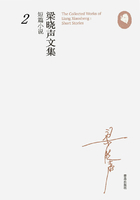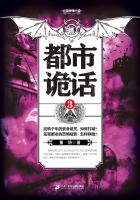In a sitting-r oom on the ground-floor, ensconced in an armchair with h er back to the light, was the owner and mistress o f the estate, a white-ha ired woman of not more than sixty, or ev en less, wear ing a large cap.She had the mobile features frequent in those whose sight has decayed by stages, has beenlaboriously striven af ter, and reluctantly let go, rather than the stagnan t mien apparent in persons long sightless or born blind.Tess walked up to this lady with her feathered charges—one sitting on each arm.
“Ah, you are the y oung woman come to look after my birds?”said Mrs.d'Urberville, recognizing a new footstep.“I hope you will be kind to them.My bailiff tells me y ou are quite the proper person.Well, where are they?Ah, this is Strut!But he is hardly so lively to-day, is he?He is alarmed at being handled by a stranger, I suppose.And Phena too—yes, they are a little f rightened—aren't you, dears?But they will soon get used to you.”
While the o ld lady had been speak ing Tess and th e o ther maid, in obedience to her gestures, had placed the fowl severally in her lap, and she had felt them over from head to tail, examining their beaks, their combs, the manes of the co cks, their wings, and their claws.Her tou ch enabled her to recognize them in a moment, and to discover if a single feather were crippled or draggled.She handled their crops, and knew what th ey had eaten, and if too little or too much; her f ace en acting a viv id pan tomime of the criticis ms passing in her mind.
The birds that the two girls had brou ght in were duly returned to the y ard, and the process was repeated till all the pet cocks and hens had been submitted to the o ld woman—Hamburghs, Bantam s, Coch ins, Brah mas, Dorkings, and such other s orts as were in fashion just then—her perception of each visito r being seldom at fault as she received the bird upon her knees.
It reminded Tess of a Confirmation, in which Mrs.d'Urberville was the bishop, the fowls the young people presented, and herself and the maid-servant the p arson and cur ate of th e paris h bring ing them up.At the end of th e ceremony Mrs.d'Urberville abruptly asked Tess, wrinkling and twitching her face into undulations, “Can you whistle?”
“Whistle, ma'am?”
“Yes, whistle tunes.”
Tess could whistle likemost other coun try girls, though theaccomplishment was one which she did not care to profess in genteel company.However, she blandly admitted that such was the fact.
“Then you will have to practise it ev ery day.I had a lad who did it verywell, but he has left.I want y ou to w histle to my bullfinches; as I cann ot see them I like to hear them, and we teach'em airs that way.Tell her where the cages are, Elizabeth.You must begin to-morrow, or they will go back in their piping.They have been neglected these several days.”
“Mr.d'Urberville whistled to'em this morning, ma'am, ”said Elizabeth.“He!Pooh!”
The old lady's face creased into furrows of repugnance, and she made no further reply.
Thus the reception of Tess by her fancied kinswoman terminated, and the birds were taken back to theirquarters.The gir l's surprise at Mrs.
d'Urberville's manner was not great; f or since seeing the size of the house she had expected no more.But she was f ar from being aware that the old lady had never h eard a word of the so-called kinship.She gathered that no g reat affection flowed between the b lind woman and her son.Bu t in th at, too, she was mistaken.Mrs.d'Urberville was not the first mother compelled to love her offspring resentfully, and to be bitterly fond.
In spite of the unpleasant initiation of the day before, Tess inclined to the freedom and novelty of her new position in the morning when the sun shone, now that she was once installed there; and she was curious to test her powers in the unexpected direction asked of her, so as to ascertain her chance of retaining her post.As soon as she was alone within the w alled gard en she sat h erself down on a coop, and ser iously screwed up her mouth for the long-neglected practice.She found her fo rmer ability to have degenerated to the production of a hollow rush of wind through the lips, and no clear note at all.
She remained fruitlessly blowing and blowing, wondering how she cou ld have so grown out of the art which had come by nature, till she became aware of a movement among the ivy-boughs which clo aked the garden-wall no less than the cottage.Looking that way she beheld a form springing from the coping to the plot.It was Alec d'Urberville, whom she had not set eyes on since he had conducted her the day before to th e door of the gardener's cottage where she had lodgings.
“Upon m y honour!”he cried, “th ere was never before such a beau tiful thing in Nature or Art as you look, ‘Cousin'Tess(‘Cousin'had a faint ring of mockery).I have been watching you from o ver the wall—sitting like Impatience on a monument, and pouting up that pr etty red mouth to wh istling shape, and whooing and whooing, and privately swearing, and never being able to produce a note.Why, you are quite cross because you can't do it.”
“I may be cross, but I didn't swear.”
“Ah!I understand why you are try ing—those bullies!My mother wantsyou to carry on their musical education.How selfish of her!As if attendin g tothese curst cocks and hens here were not enough work for any girl.I wouldflatly refuse, if I were you.”
“But she wants me par ticularly to do it, an d to be ready by to-morrow morning.”
“Does she?Well then—I'll give you a lesson or two.”
“Oh no, you won't!”said Tess, withdrawing towards the door.
“Nonsense; I don't want to touch you.See—I'll stand on th is side of the wire-netting, and you can keep on the other; so you may feel quite safe.Now, look here; you screw up your lips too harshly.There'tis—so.”
He suited the act ion t o t he word, an d whistled a line of“Take, O tak e those lips away.”But the allusion was lost upon Tess.
“Now try, ”said d'Urberville.
She attempted to look reserved; her face put on a s culptural severity.But he persisted in his demand, and at last, to get rid of him, she did put up her lips as directed for producing a clear note; laughing distressfully, however, and then blushing with vexation that she had laughed.
He encouraged her with“Try again!”
Tess was qu ite ser ious, painfully ser ious by th is tim e; and s he tried—ultimately and unexpectedly emittin g a real ro und sound.The momentary pleasure of success got the better of her; her ey es enlarged, and sheinvoluntarily smiled in his face.
“That's it!Now I have star ted y ou—you'll go on beau tifully.There—I said I wou ld not come near y ou; and, in sp ite of such temptation as n ever before fell to mortal man, I'll keep my word……Tess, do y ou think my mother a queer old soul?”
“I don't know much of her yet, sir.”
“You'll find her so; she must be, to make y ou learn to whis tle to h er bullfinches.I am rather out of her b ooks just no w, but y ou will be quite in favour if y ou treat her live-stock well.Good morning.If y ou meet w ith any difficulties and want help here, don't go to the bailiff, come to me.”
It was in the economy of this régime that Tess Durbeyfield had undertaken to fill a plac e.Her first day's experiences were f airly typical of those which followed through many succeeding days.A familiarity with Alec d'Urberville's presence—which that y oung m an carefully cultivated in her by pl ayful dialogue, an d by jestingly callin g her his cousi n when they were alon e—removed much of her original shyness of h im, without, however, implanting any feeling which could engender shyness of a new and tenderer kind.But she was more pliable under his hands than a mere companionship would have made her, owing to her unavoidable d ependence upon his mother, and, through that lady's comparative helplessness, upon him.
She soon fo und th at whistling to th e bullf inches in Mrs.d'Urberville's room was no such onerous business when she had regained the art, for she had caught fro m her musical mother nu merous airs that su ited those song sters admirably.A far more satisfactory time than when she practised in the garden was this whistling by th e cages each m orning.Unrestrained by the y oung man's presence she thr ew up her m outh, put h er lips near the bars, and piped away in easeful grace to the attentive listeners.
Mrs.d'Urberville slept in a large fo ur-post beds tead hu ng with heavy damask curtains, and the bullfinches occupied the same apartment, where they flitted about freely at certain hours, and made little white spots on the furniture and upho lstery.Once while Tess was at the wind ow where the cag es wer e ranged, giving her lesson as usual, she thought she heard a rustling behind the bed.The old lady was not present, and turning round the girl had an impression that the toes of a pair of boots wer e visible below the f ringe of the curtains.Thereupon h er whistlin g became so disjointed th at the listener, if such there were, must have discov ered her sus picion of his presence.She searched th e curtains every morning after that, but never found anybody within them.Alec d'Urberville had evidently though t better of his freak to terrify her by an ambush of that kind.
10
Every village has its idiosyncrasy, its constitution, often its own code ofmorality.The levity of some of the younger women in and about Trantridge was marked, and was p erhaps symptomatic of the choice spirit who ruled The Slopes in that vicinity.The place had also a more abiding defect; it drank hard.The staple conversation on the farms around was on the uselessness of sav ing money; and sm ockfrocked arith meticians, leaning on their p loughs or h oes, would enter into calculations of great nicety to pro ve that par ish relief was a fuller prov ision for a man in his o ld age than any which could resu lt f rom savings out of their wages during a whole lifetime.
long bef ore her.It was a fin e Sep tember ev ening, just befor e sunset, when yellow lights struggle w ith blue shades in hairlike lines, and the atm osphere itself for ms a prospect withou t aid from more soli d obj ects, ex cept the innumerable winged insects that dance in it.Through this low-lit mistiness Tess walked leisurely along.
The chief pleasure of these philosophers lay in going every Saturday night, when work was done, to Chaseborou gh, a decay ed markettown two or th ree miles distant; and, returning in the small hours of the nex t morning, to spend Sunday in sleeping off the dyspeptic effects of the curious compounds sold to them as beer by the monopolizers of the once independent inns.
For a long tim e Tess did not join in the weekly pilgr images.But under pressure from matrons not much older than hers elf—for a f ieldman's wa ges being as high at twenty-one as at forty, marriage was early here—Tess at length consented to go.Her first exper ience of the journ ey afforded her more en joy-ment than s he had exp ected, the h ilariousness of the oth ers being quite contagious after her monotonous attention to the poultry-farm all the week.She went again and again.Being graceful and interesting, standing moreover on the momentary threshold of womanhood, her appear ance drew d own upon her some sly regards from loungers in the streets of Chaseborough; hence, though sometimes her journey to the tow n was m ade indepen dently, she alway s searched fo r her fello ws at n ightfall, to ha ve th e pro tection of their companionship homeward.
This had go ne on for a m onth or two when there came a Saturday in September, on which a fair and a market co incided; and the pilgrim s from Trantridge sought dou ble d elights at th e inns on that acco unt.Tess's occupations made her late in setting out, so that her comrades reached the town She did not discover the coincidence of the market with the fair till sh e had reached the p lace, by which time it was close upon d usk.Her limited marketing was soon completed; and then as usual she began to look about for some of the Trantridge cottagers.
At first she could not find them, and she was informed that most of them had gone to what they called a private little jig at the house of a hay-trusser and peat-dealer who had transactions with their farm.He lived in an out-ofthe-way nook of the townlet, and in trying to find her course thither her eyes fell upon Mr.d'Urberville standing at a street corner.
“What—my Beauty?You here so late?”he said.
She told him that she was simply waiting for company homeward.
“I'll see y ou again, ”said he ov er her shoulder as she wen t on down th e back lane.
Approaching the hay-trussers she co uld hear the fidd led notes of a re el proceeding f rom so me b uilding in the rear; bu t no sound of dancing was audible—an excep tional state of th ings for thes e parts, whe re as a ru le th e stamping drowned the music.The front door being open she could see straight through the house in to the garden at the back as far as th e s hades of nig ht would allow; and nobod y appearing to her kno ck she trav ersed the dwelling and went up the path to the outhouse whence the sound had attracted her.
It was a windowless er ection us ed for stor age, and fro m the open doo r there floated into the obscurity a mist of y ellow radiance, which at first Tess thought to be illuminated smoke.But on dr awing nearer she perceived that it was a cloud of dust, lit by candles within the outhouse, whose beams upon the haze carr ied forward the outlin e of the doorway into the wide night of the garden.
When she came close and looked in she beheld indistinct forms racing up and down to the f igure of the d ance, the silence of their footfalls arising fromthere being over-shoe in“scroff”—that is to say, the powdery residum from the storage of peat and oth er products, the stirring of which by their turbulent feet created th e nebulosity that invo lved the scene.Through th is floating f usty débris of peat and hay, mixed with the perspirations and warmth of the dancers, and forming together a sort of vegeto-human pollen, the muted fiddles feebly pushed their notes, in marked contrast to the spirit with which the measure was trodden out.They coughed as they danced, an d laughed as they coughed.Of the rushing couples there could barely be discerned more than the high lights—the indistinctness shap ing them to saty rs clasping ny mphs—a m ultiplicity of pans whirling a multiplicity of Syrinxes; Lotis attempting to elude Priapus, and always failing.
At intervals a couple would approach the doorway for air, and the haze no longer veiling their features, the demigods resolved themselves into the homely personalities of h er own next-door neighbours.Could Trantridge in two or three short hours have metamorphosed itself thus madly!
Some Sileni of the throng sat on benches and hay-trusses by the wall; and one of them recognized her.
“The maids don't think i t respectable to dance at‘The Flower-deLute, ”'he explained.“They don't like to let everybody see which be their fancy-men.Besides, the house sometimes shuts up just when their jints begin to get greased.So we come here and send out for liquor.”
“But when be any of you going home?”asked Tess with some anxiety.
“Now—a'most directly.This is all but the last iig.”
She waited.The reel drew to a close, and some of the party were in th e mind for starting.But others would not, and another dance was formed.This surely would end it, thought Tess.Bu t it merged in y et another.She became restless and uneasy; yet, having waited so long, it was necessary to wait longer; on account of the fair the roads were dotted with roving characters of possibly ill intent; and, though not fearf ul of measurab le dang ers, she feared the unknown.Had she been near Marlott she would have had less dread.
“Don't ye be nervous, my dear go od soul, ”expostulated, between his coughs, a y oung man with a wet face, and his str aw hat so far back upon his head that th e brim encircled it like the nim bus of a saint.“What's yer hurry?To-morrow is Sunday, thank God, and we can sleep it off in church-time.Now, have a turn with me?”
She did not abhor dancing, but she was not going to dance here.Th emovement g rew more p assionate:th e fiddlers behind the luminous pillar o f cloud now and then varied the air by playing on the wrong side of the bridge or with the b ack of the b ow.But it did no t matter; the pan ting shapes s pun onwards.
They did not vary their partners if their inclination wer e to stick to previous ones.Changing partners simply, meant that a satisfactory choice had not as y et been arrived at by one or other of the pair, an d by this time every couple had been suitably matched.It was then that th e ecstasy and the dream began, in which em otion was the matter of th e universe, and matter but an adventitious intrusion likely to hinder you from spinning where you wanted to spin.
Suddenly there was a d ull thump on the ground:a couple had fallen, and lay in a mixed heap.The next cou ple, unab le to check its progress, came toppling over the obstacle.An inner cloud of dus t rose aroun d the prostrate figures amid the general one of the room, in which a twitching entanglement of arms and legs was discernible.
“You shall catch it for this, my gentleman, when you get home!”burst in female accents from the human heap—those of the unhappy partner of the man whose clumsiness had caused the mishap; she happened also to be his recently married wife, in which assortm ent there was noth ing unusual at Trantridge as long as any affection remained between wedded couples; and, indeed, it was not uncusto mary in their later lives, to avoid making odd lots of the single people between whom there might be a warm understanding.
A loud laugh from behind Tess's back, in the shade of the garden, united with the titter within the room.She looked round, and saw the red coal o f a cigar:Alec d'Urberville was standing there alone.He beckoned to her, and she reluctantly retreated towards him.
“Well, my Beauty, what are you doing here?”
She was so tired after h er long day and her walk that she confided hertrouble to him—that she had been waiting ever since he saw her to have theircompany home, because the road at night was strange to her.“But it seems they will never leave off, and I really think I will wait no longer.”
“Certainly do not.I hav e only a sad dle-horse here to-d ay; b ut co me to‘The Flower-de-Luce, 'and I'll hire a trap, and drive you home with me.”
Tess, th ough flattered, h ad nev er qu ite go t ov er her or iginal mistrust o f him, and, despite their tardiness, she preferred to walk home with the work-folk.So she answered that she was much obliged to him, but would not trouble him.“I have said that I will wait for'em, and they will expect me to now.”
“Very well, Miss Independence.Please yourself……Then I shall not hurry……My good Lord, what a kick-up they are having there!”
He had no t put h imself forward in to the light, b ut so me of them had perceived him, and his presence led to a slight pause and a consideration of how the time was flying.As soon as he had re-lit a cigar and walked away the Trantridge people began to collect themselves from amid those who had come in from other farms, and prepared to leave in a body.Their bundles and baskets were gather ed up, and half an hour later, when the clock-chim e sounded a quarter past eleven, they were stragg ling along the lane which led up the hill towards their homes.
It was a three-mile walk, along a dry white road, made whiter tonight by the light of the moon.















